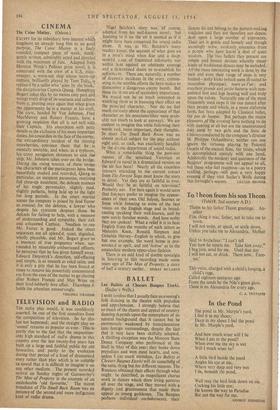EXCEPT for its subsidiary love interest which lengthens. an already
long film to no good purpose, The Caine Mutiny is a finely rounded, compact piece of work, intelli- gently written, admirably acted and directed with the minimum of fuss. Adapted from Herman Wouk's Pulitzer prize novel, it is concerned with the crew of a U.S. mine- sweeper, a worn-out ship whose worn-out captain,- brilliantly played by Tom Tully, is replaced by a sailor who 'goes by the book,' the disciplinarian Captain Queeg. Humphrey Bogart takes this by no means easy part and wrings every drop of its sourness and sadness from it, proving once again that when given the opportunity he is a master at his craft. The crew, headed by Van Johnson, Fred MacMurray and Robert Francis, have a growing suspicion that all is not well with their Captain. His absorption with petty details to the exclusion of his more important duties, his cowardice in the face of the enemy, the extraordinary incident of the missing strawberries, convince them that he is mentally unstable, and when, in a typhoon, his crazy navigation threatens to sink the ship, Mr. Johnson takes over on the bridge. During the rising tension of these scenes the characters of the participants have been beautifully studied and recorded, Quccg in particular, an incipient paranoiac, receiving full close-up treatment, the delicate nuances of his tragic personality, slightly mad, slightly pathetic, being held up to the light for long periods. In the court martial scenes the company is joined by Jose Ferrer as counsel for the defence, a lawyer who despite his cynicism despises those he defends for failing to help, with a measure of understanding and sympathy, their sick and exhausted Captain. Needless to say Mr. Ferrer is good. Indeed the court sequences are all splendid, quiet, dignified, wholly plausible, and Mr. Bogart gives us a moment of true poignancy when, sur- rounded by miserably embarrassed officers, he perceives that he has given himself away. Edward Dmystryk's direction, self-effacing and simple, is as smooth as oiled satin, and it is only a pity that he has been forced at times to remove his powerfully concentrated eye from the core of the matter to go chasing after Robert Francis and May Winn on their land-lubberly love affair. Elsewhere it holds the attention unswervingly.
VIRGINIA GRAHAM


































 Previous page
Previous page